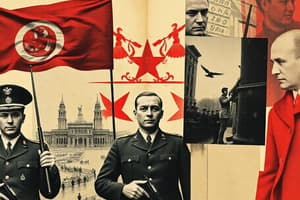Podcast
Questions and Answers
What is militarism?
What is militarism?
- A deep devotion to one's nation
- The competition for industrial dominance among nations
- An informal alliance between states
- The policy of glorifying military power and keeping an army prepared for war (correct)
What was the impact of militarism in Europe beginning in the 1890s?
What was the impact of militarism in Europe beginning in the 1890s?
It led to a dangerous arms race among European powers.
Define nationalism.
Define nationalism.
A deep devotion to one's nation.
The Triple Alliance included Germany, Austria-Hungary, and ______.
The Triple Alliance included Germany, Austria-Hungary, and ______.
What was the Triple Entente?
What was the Triple Entente?
Imperialism had no role in the events leading to World War I.
Imperialism had no role in the events leading to World War I.
What conflict did Germany and France nearly engage in over Morocco?
What conflict did Germany and France nearly engage in over Morocco?
What was the impact of nationalism in the 20th century among European powers?
What was the impact of nationalism in the 20th century among European powers?
Define entente.
Define entente.
Study Notes
Militarism
- Militarism emphasizes the glorification of military strength and maintaining an army ready for conflict.
- The late 19th century saw a rise in militarism due to burgeoning nationalism, fueling a European arms race.
- By 1914, major powers (excluding Britain) boasted significant standing armies, enabling rapid mobilization during wartime.
Nationalism
- Nationalism represents a profound loyalty and commitment to one's nation.
- In the 20th century, competition escalated among major European nations like Germany, Austria-Hungary, and Great Britain, driven by a quest for resources and markets.
- Until the mid-19th century, Great Britain held a dominant position in industry, finance, and global shipping.
- Post-1850, Germany began to rival British supremacy in industrial output, while Austria-Hungary and Russia vied for control in the Balkans, where various ethnic groups sought independence.
Imperialism
- Imperialism was a critical factor leading to World War I, as European nations vied for colonial possessions in Africa and Asia.
- Tensions arose in 1905 and 1911 when Germany and France almost clashed over Morocco, with Germany retreating due to widespread European support for France.
Alliance Systems
- The Triple Alliance consisted of Germany, Austria-Hungary, and Italy, fostering a military partnership among these nations.
- The Triple Entente formed an understanding between Britain, France, and Russia, establishing a counterbalance to the Triple Alliance.
- Entente generally refers to a friendly agreement or informal alliance between nations or factions.
Studying That Suits You
Use AI to generate personalized quizzes and flashcards to suit your learning preferences.
Description
Test your knowledge on key concepts such as militarism, nationalism, and imperialism with flashcards. This quiz will help you understand the significant impacts these ideas had on historical alliances and conflicts in Europe leading up to World War I.




